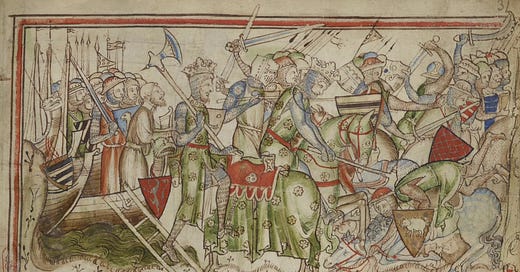II: Beyond Damnation
From Considerations on the Cause of the Greatness of the Romans and their Decline by Montesquieu:
At the birth of societies, the leaders of republics create the institutions; thereafter, it is the institutions that form the leaders of republics
It’s hard to believe: No Brow is two years old. I still remember how nervous I was about my first post. I hesitated at first because my thoughts felt unformed, and I worried about putting something out there I couldn’t take back. Writing has become a little easier, and for that, I’m grateful. To those of you who’ve journeyed with me, graciously overlooking countless typos or the meandering sentences all I can say is thank you. Your patience and encouragement have been a gift. Here’s to many more years. 🎉 Now let’s get to it.
In my last post, I touched on how religions take shape and the key issues they must address—guidance on how to live and behave, systems of reward and punishment, engagement with society, and their approach to expansion. These foundational stances often remain stable. Yet splintering is almost inevitable. Once the founder passes away, no matter how well succession is planned or how sacred the texts may be — divinely inspired or otherwise — conflict tends to arise over time. These conflicts are often fuelled by perceived distortions of the original vision or differing interpretations of texts or teachings. Some religions are more prone to splintering than others. Yet, even when splintering occurs, there are usually fundamental points of agreement between the splinter group and the original. For instance, they may continue to use the same sacred texts rather than abandon them entirely. Alternatively, they might revise these texts to remove elements they disagree with or introduce new ones to complement the original teachings. For Christians, there are currently over 45,000 denominations. At this point, I’m not even sure if we should still call it splintering. I heard a joke recently about why Britain doesn’t celebrate Independence Day: It is because the rest of the world is busy celebrating their independence from Britain. Perhaps the sheer number of denominations could still be traced back to splintering from the Catholic Church, the original "parent" institution. You could also think of splintering in terms of political parties. Why do members of one party break away to form another? The motivations are often strikingly similar —disagreements over vision, leadership, or direction. The same logic applies to countries and secessionist movements. When the center cannot hold, factions inevitably seek their own path. For Christians, however, the emergence of a new denomination is a non-event. It’s expected — an accepted part of the landscape — since the idea of curbing it was abandoned long ago. But with political parties, unity is a different story. For countries, it’s another altogether. In political parties, splinter groups often emerge with the belief that they can address shortcomings in the original group. Whether they succeed depends on their ability to deliver on their promises (if they make any) and maintain unity within their ranks. 🐝
For secessionists, the reasoning is a tad different. They tend to feel that the parent country is either indifferent to their welfare or actively working against their interests. Of course, there are myriad other reasons beyond these two, ranging from cultural, religious and economic divides to historical grievances and identity issues. Returning to the matter of differing interpretations, give person X and person Y the same text, and they will almost inevitably draw different conclusions about its meaning. Interpretation is not a harmless sport, especially in religion, where meaning is debated and carries consequences. Simply put, there’s the religion’s core message, and then there’s the cleric’s interpretation — filtered, for better or worse. The cleric, as the intermediary, shapes what followers receive. This back-and-forth between doctrine and interpretation is where tensions abound. In his book Pastoral Care, Pope Gregory describes clergy as "physicians of the soul," charged with the task of tending to the spiritual well-being of their communities. He cautions that those unskilled in this role should “venture not to approach any office of authority,” for in their ignorance, they risk leading others astray. It is the classic case of the blind leading the blind. One might ask: can’t followers simply read the texts themselves and form their own conclusions? The answer, of course, is yes—they can. Yet that doesn’t diminish the influence clergy hold over people. It’s easy to imagine, then, that among the many denominations across different religions, there are inevitably the unskilled or the unscrupulous — wolves in sheep’s clothing, so to speak. If anything, this should come as no surprise. The more pressing question, however, is this: how does one identify a misguided or harmful cleric? The answer is not as straightforward as it might seem, because even this assessment depends on our understanding of what makes a good cleric. Is it their knowledge of sacred texts? Their ability to inspire and guide? Their adherence to moral principles? Or perhaps it’s something more intuitive — a sense, felt rather than measured, that something is amiss. After all, a cunning wolf will disguise itself so well that recognising its true nature becomes an almost impossible task. 🐺
As for the blatantly bad, they justify their behavior by embedding it within doctrine. They mold the perception of their followers by normalising their actions until what is bad begins to seem good, and what is questionable becomes accepted as righteous. But even when we see through the illusions of the cunning wolf or are appalled by the blatantly bad, the question remains: what do we do? Should we interfere or not? If we do, how do we do so? It seems natural to assume that exposing a cleric’s misdeeds would lead to disillusionment among their followers. "Let the truth speak for itself," you might say. Yet history and present reality tells a different story. There have been cases where such revelations, rather than diminishing their influence, only strengthened it. It’s a dynamic not unlike what happens when a nation is sanctioned. One might expect the resulting hardship to trigger dissent against its leaders, yet it sometimes has the opposite effect — it only strengthens their loyalty. The hardship is perceived as an external attack, uniting people around their leader in a show of defiance. One of the most extreme cases unfolded in the 1970s. Facing mounting pressure from concerned relatives, the press, and even the government, Jim Jones, leader of the Peoples Temple, relocated some of his followers from the United States to a 27,000-acre commune he had established in Guyana. The concerned relatives were a mix of defectors and those worried about friends and family members ensnared by Jones. Many defectors had spoken out to the press, exposing the abuses occurring within the Peoples Temple. Others had appealed to the government, urging an investigation into the troubling claims surrounding Jones and his organization. One father had even signed away parental rights to his son, placing him under Jones’ control. Many others sold their homes, and those who didn’t own property sold their watches, rings, and whatever they had, donating everything to the Peoples Temple in a display of unwavering devotion. And if that seemed nuts to you, the events of November 1978 proved even more horrifying. 🐦⬛
Thanks for reading. If there's anything you'd like to chat about, or if you have any questions, feel free to shoot me an email. I'd love to hear from you. :) 🍿





